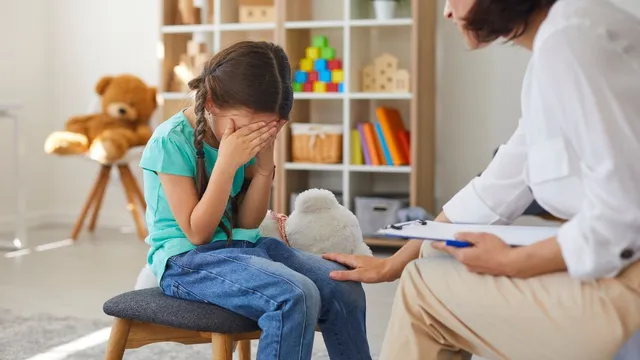- By Bornika Das
- Fri, 22 Aug 2025 07:35 PM (IST)
- Source:JND
Children today are brought up with so many opportunities, yet so much pressure. Academic pressures, social comparison, digital input and even family issues can quietly impact their emotional health. As opposed to adults, kids usually do not have the vocabulary or the consciousness to communicate what they are experiencing, thus allowing initial symptoms of anxiety, depression, or other mental health problems to remain unnoticed. What appears to be "mood swings" or "acting out" may at times be a child's expression of underlying struggles that must be addressed.
This is the reason parents and teachers, who have the greatest exposure to a child's day-to-day behaviour, have a critical role in early identification. Telling changes in eating, sleeping, school work or social relationships may be the first signs of distress. Identifying such cues in time and providing timely assistance can be a game-changer, avoiding escalation of problems and enabling kids to develop healthier coping strategies. In conversation with The Daily Jagran, Ms. Jasreen Birgi, City Lead psychologist at LISSUN, Mental Health Startup, shares warning signs every parent and teacher should look out for in any mental health issue in children.
Warning Signs Of Mental Health Issues In Children
Emotional And Behavioural Shifts
If a usually cheerful child becomes unusually irritable, withdrawn, or aggressive, it could signal deeper distress. Ms. Jasreen Birgi states, “Persistent sadness, frequent crying, or sudden loss of interest in favourite activities should not be brushed aside as “just a phase.”” Keep an eye out for feelings that appear out of proportion or unusually enduring for their age.
ALSO READ: How Moving Your Body Transforms Your Mental Well-Being; Know From Expert
Academic And Concentration Difficulties
Mental health issues often show up in classrooms. Declining grades, daydreaming excessively, trouble focusing, or forgetting instructions can stem from stress, anxiety, or depression rather than lack of effort. Teachers noticing changes in participation or sudden disinterest in activities should pay closer attention.
Parents/guardians should also understand that school behaviour and performance may reveal underlying emotional issues, like a pattern of missing school too often, unwillingness or reluctance to go to school, occasionally coupled with complaints of sickness, should not be ignored.
Physical Complaints Without Medical Cause
Headaches, stomachaches, or fatigue without a medical explanation are often how children express emotional strain. Ms. Jasreen Birgi states, “Repeatedly low energy levels, impacting their ability to engage in daily routines or frequent visits to the school infirmary may hint at hidden anxieties.”

Early Signs Of Mental Health Issues In Children (Image Credits: Canva)
Social Withdrawal And Relationship Struggles
Avoidance of peers, reluctance to attend group activities, or frequent quarrels with friends may reflect low self-esteem, bullying (either as the victim or the aggressor), or social anxiety. Ms. Jasreen Birgi mentions, “When children feel misunderstood or unsafe, they often retreat into isolation. Both parents and teachers should notice whether a child is increasingly isolating themselves.”
Changes In Sleep And Appetite
Difficulty sleeping, recurring nightmares, sudden overeating, or skipping meals are signs that a child may be coping with stress, fear, or sadness. Such changes must not be ignored. It can often accompany anxiety, depression, or trauma responses.
Age-Related Measures
The way children behave varies greatly based on their developmental level. Even though the symptoms listed above are broad indicators, it can be useful to pay attention to warning signs that are specific to a given age.
Preschoolers And Toddlers
Regression, such as going back to thumb-sucking or bedwetting after becoming proficient in such techniques.
Refusal to let go of caregivers or excessive clinging.
Extreme apprehension about unfamiliar situations or individuals.
Age Of Elementary School
Hyperactivity or difficulty focusing that goes beyond typical age-appropriate levels.
Emotional dysregulation that results in frequent tantrums.
Negative self-talk, like "I'm not good at anything," or persistently poor self-esteem.
ALSO READ: Shed That Tear: What Is A Crying Club? Mumbai Takes Inspiration From This Japanese Practice
Teens And Preteens
Risk-taking habits, such as substance abuse or careless behaviour.
Self-harm (burning, cutting) or talking about hopelessness a lot.
Severe personality changes, such as becoming excessively secretive or withdrawn.
Mental health struggles in children often whisper before they shout. Parents and teachers in India can make a powerful difference by staying observant, offering empathy and providing the safe space children need to open up. Early recognition, gentle conversations, and timely professional help can make the difference between silent suffering and healthy growth.

